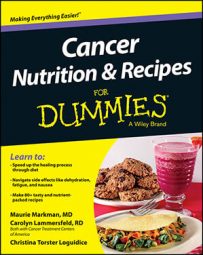Chemotherapy and radiation kill rapidly dividing cells like cancer cells, but they also affect the rapidly dividing cells lining your digestive tract, including those lining your mouth and throat. For this reason, you may experience a sore mouth or throat during cancer treatment, which can make eating exceedingly uncomfortable.
Some foods and liquids may increase discomfort by irritating your mouth or throat, whereas others may even be soothing and enable you to meet your quantity goal.
When dealing with a sore mouth or throat, be sure to take any medications that have been prescribed to treat this. In addition, try the following nutrition tips to maintain your nutritional intake and ensure adequate hydration:
Drink smoothies and/or high-calorie, high-protein liquid supplement drinks. Liquids are likely to be less irritating to the lining of your mouth or throat than solid foods, and you may even find them soothing. Drinkable yogurt or kefir may feel silky going down, and the healthy bacteria they contain may help you heal. Homemade smoothies and shakes also work well.
Ready-to-drink liquid supplements taken several times a day can help you meet your nutritional needs. Orgain, which is made with organic ingredients, is one of the cleanest meal replacements on the market. It can be found at some drugstores and health-food stores, or you can order it online through various retailers, including Amazon.
Other options include Carnation Instant Breakfast drinks, Ensure, Boost, Muscle Milk, and even some supplemental drinks intended for weight loss, like Slim-Fast shakes. If you drink enough to meet your caloric needs, you won’t lose weight, regardless of a drink’s intended purpose.
Eat soft, bland foods. If liquids are well tolerated, try moving on to soft, bland foods, which are less likely to irritate the lining of your mouth or throat than coarse, acidic, or spicy foods. Focus on soft, high-protein foods like tuna, chicken, eggs, refried beans, and cottage cheese.
Avoid irritants. Tobacco, alcohol, and foods and beverages that are hot, spicy, acidic, or hard/coarse (like bread and crackers) will most likely increase pain. Even healthy foods like fruits and fruit juices, because of their acidity, will often increase pain. Try to avoid these foods until your mouth and throat are healed.
Increase the nutrient density of what you can eat and drink. Add protein powders or nonfat dry milk to some of the soft, bland foods mentioned earlier. Also, small amounts of healthy fats and oils like canola oil or olive oil, avocado, or soft margarine or butter can be added to foods.
Even a little pure maple syrup may be tolerated. Cooked cereals like Cream of Wheat, Cream of Rice, and oatmeal work well with some of these additions.
Try honey. Several studies have shown that honey may help reduce pain and speed healing of a sore mouth or throat, especially during radiation therapy, but it may also be worth trying honey if you experience this side effect from chemotherapy.
One tablespoon three or four times daily during treatment is generally recommended. For maximum benefit, honey should be taken 15 minutes before treatment, 15 minutes after treatment, and 6 hours after treatment. While using honey, just be sure to practice good oral hygiene to prevent cavities. If you have diabetes or high blood glucose, you’ll need to count the carbohydrate in honey toward your daily allowance.
Maintain good oral hygiene. When you have sores in your mouth or throat, your risk of infection is increased. Good oral hygiene can help prevent an infection and may promote healing. Rinse your mouth before and after meals with some saltwater. Don’t use mouthwash containing alcohol.
Also, be sure to use a toothbrush with very soft bristles to brush your teeth. Try making a homemade rinse by mixing 4 cups water, 1 teaspoon salt, and 1 teaspoon baking soda. Sip, swish, and spit after every meal. Mix daily.
Ask your oncologist about using glutamine. Glutamine is a nonessential amino acid that may become essential during a stressful illness, because the body uses it in higher-than-normal amounts for a variety of functions. Glutamine is also the preferred fuel of the cells lining your digestive tract, including your mouth and throat.
Some studies suggest swishing your mouth with and swallowing a glutamine mixture may help with pain and healing. Glutamine is available over the counter. It’s usually taken in doses of 10 g three times a day or 15 g twice a day. It can be mixed with smoothies or fruit juices and nectars. The online resource ConsumerLab.com can help you find brands of glutamine that have passed quality testing.
There are some concerns that glutamine supplements may interact with some chemotherapies. For this reason, it should only be used if recommended and supervised by your oncologist.
Try sucking on frozen fruit and ice chips. Sucking on frozen fruit and ice chips may help numb your mouth or throat, relieving pain or discomfort so you can eat. In addition, sucking on ice chips during chemotherapy infusion has been shown to reduce the likelihood of a sore mouth, particularly with the chemotherapy agent 5-fluorouracil (5-FU).
There are also medications that can help with a sore mouth or throat, so seek help from your healthcare team if you need it.

